Learn in this post how to make a beautiful, Japanese apron with cross-back straps. This apron is perfect for fall, displaying cozy fall colors and patterns. It’s an easy project, resulting in a lovely apron with large, practical pockets.
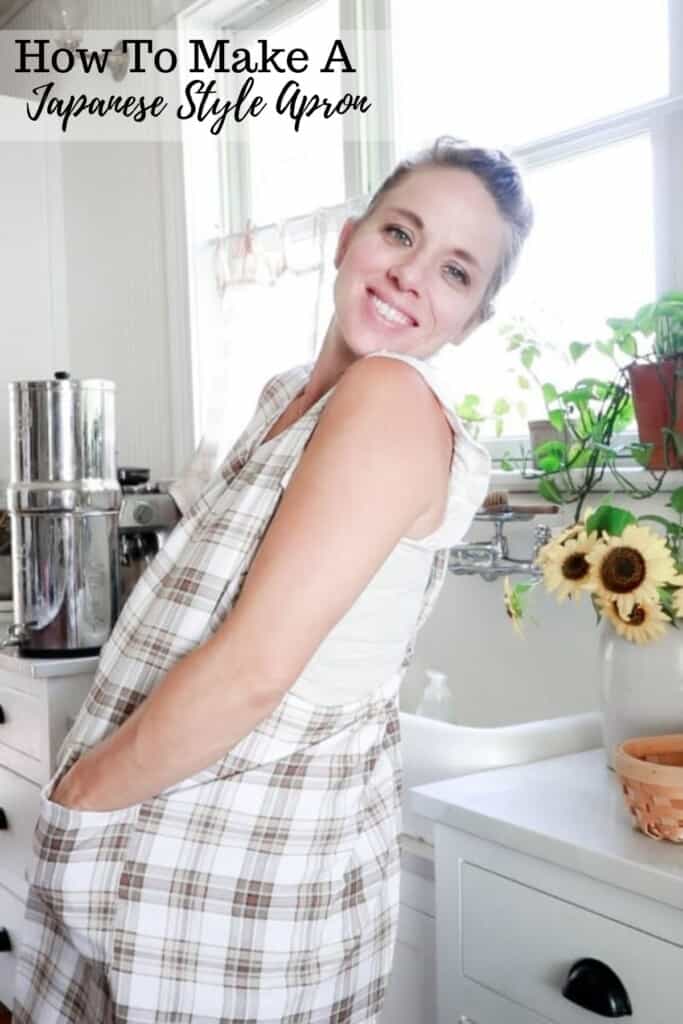
It is definitely starting to feel like fall around the farm. This morning when I went out to do the chores, I had to throw on a sweater. However, the garden is still blooming, as we haven’t had a frost yet.
We are starting to make more recipes with bone broth and comforting ingredients like root vegetables, meats, and creamy additions. Pumpkin spice has started to make an appearance as well, with a pumpkin chai in the afternoon. The house is starting to shift from summer to a cozier fall atmosphere.
The whole house got a fluffing to bring in those textures, colors, and the indoor warmth of fall. We rearranged all of the bedrooms to fit our current life circumstances. Our bedroom was moved to what was the living room. It is so nice to have a door in our bedroom that leads out to our side porch, to enjoy coffee in the mornings. So while I was making the bed and fluffing the linens, the screen door allowed that fall breeze to blow through.
It’s the beginning of the cozy, dreamy fall season.
This post contains affiliate links, which means I make a small commission at no extra cost to you. See my full disclosure here.
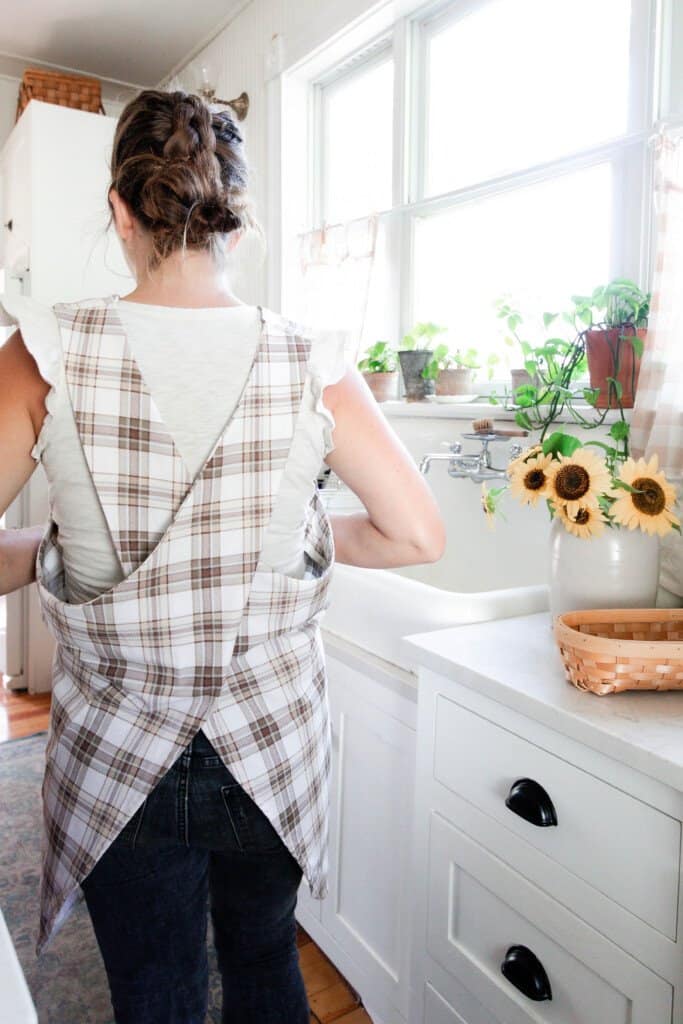
Creating A Fall Inspired Japanese Apron
One thing that I wanted to do was sew a new Japanese style apron to hang on the wall with those lovely fall colors. So I headed to Walmart and picked up some fabric from Better Homes and Garden.
They have this Brother sewing machine that I have purchased for two of my children and for myself. They also have Better Homes and Garden two-yard, pre-cut fabric and a wide variety of fabrics. I’ve been purchasing fabric from Walmart for many, many years.
In our old town, we didn’t have a fabric store for 30 miles. Walmart was the only place nearby to purchase all the things needed for sewing projects, for which I was super grateful.
I actually created a Japanese apron printable pattern for you to be able to easily print it off and create this project. You can either print it off at home and tape it together, or take it to a print shop and print it off on a large piece of paper. It ended up costing me about $6 to get it printed.
This was a really simple project, and if you love the farmhouse style like I do, hanging aprons out on hooks compliments wicker baskets, pitchers of flowers, and wooden cutting boards. And so for me, aprons are part of the decor. If I have any leftover fabric, I’ll use it to create a tea towel, or have my daughter make a hot pad, just to display more of that cozy fall fabric.
Tools you may need:
Brother full size sewing machine
Better Homes & Gardens 100% Cotton 72″ x 45″, 2 Yard Precut Fabric Plaid Color
Dritz long pearlized pins, size 24
Bias tape
All purpose white thread
Sewing scissors
Cordless iron
Another great fall plaid fabric option
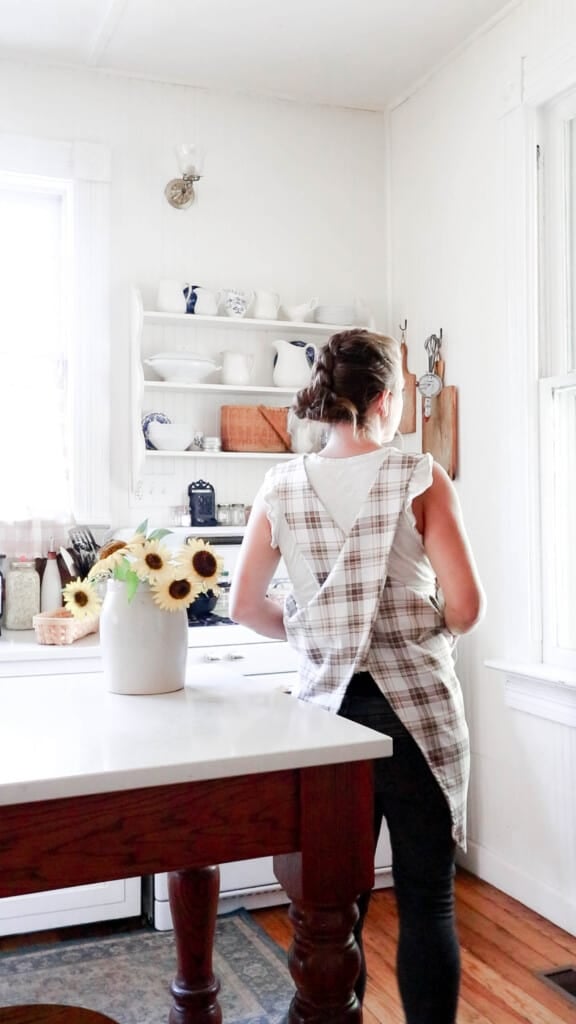
How To Make A Japanese Apron – Cross-Back Apron
Click HERE to download the pattern in full size.
Click HERE to print the pattern on your home printer.
Pattern for home computer
Pattern for print shop
Cut out the paper pattern.
Wash, dry, and iron fabric. This is good to do before sewing any project, to prevent the fabric from drying funky after the project has been made.
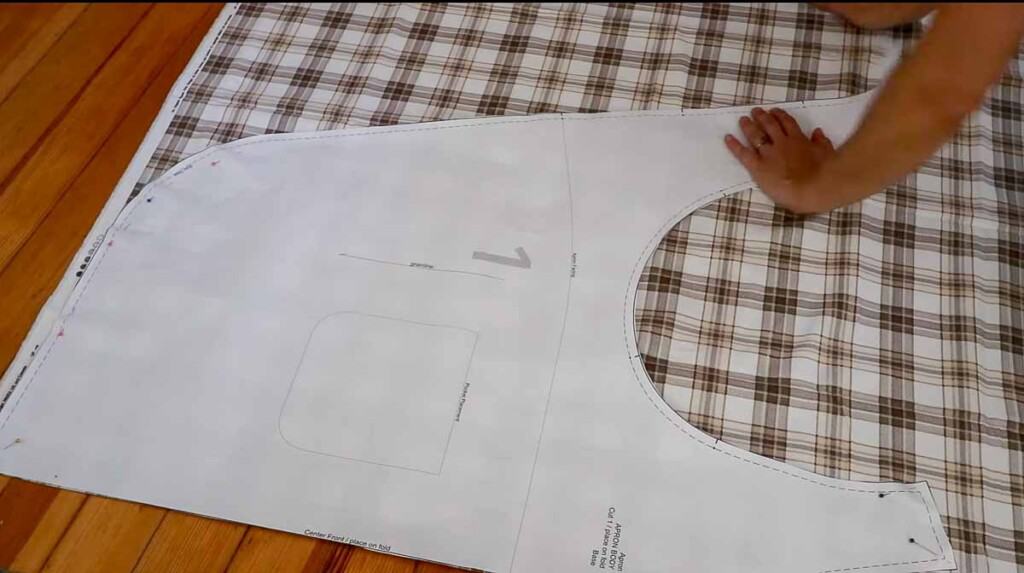
Fold the fabric in half and place the large, main section of the pattern along the fold and pin in place. You have to place the pattern very strategically so that it fits a two-yard piece of fabric.
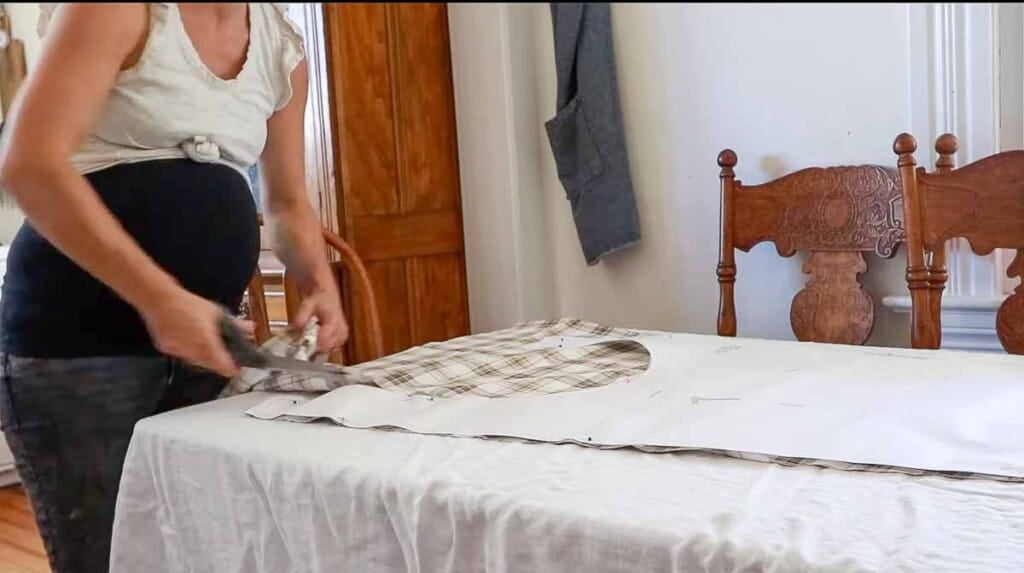
Cut out the pattern. If you are only using two yards, you will have to cut the interfacing in two spots rather than on the fold, adding a little extra fabric to one side in order to sew it together down one side.
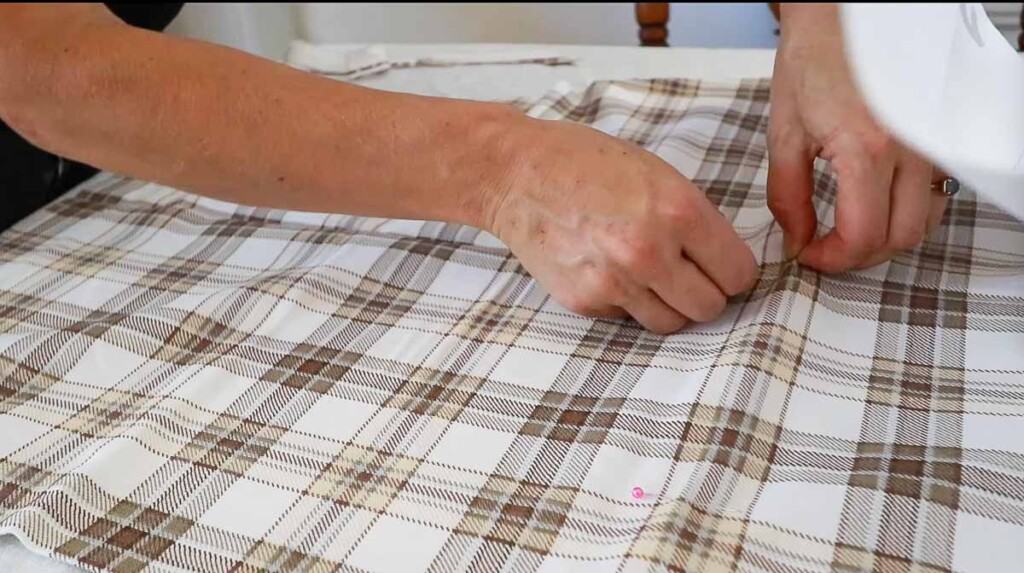
While the pattern is still somewhat pinned on, place pins to mark where the pockets belong. I added four pins at the corners to mark it.
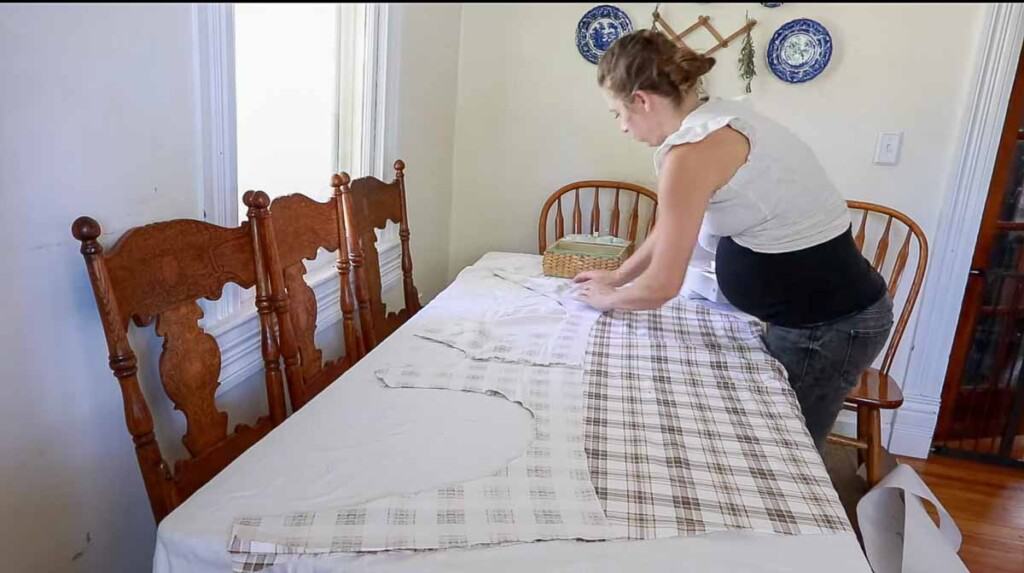
Lay the main apron piece down on a table or flat surface, pattern side up. Place the interfacing piece right-side down, matching up with main piece and pin.
Sew all the way around, leaving the tops of the straps and the bottom open.
Around all the curves of the straps and neckline, cut little slits just around the curves. Don’t cut into the seam line. This will help it lay flat.
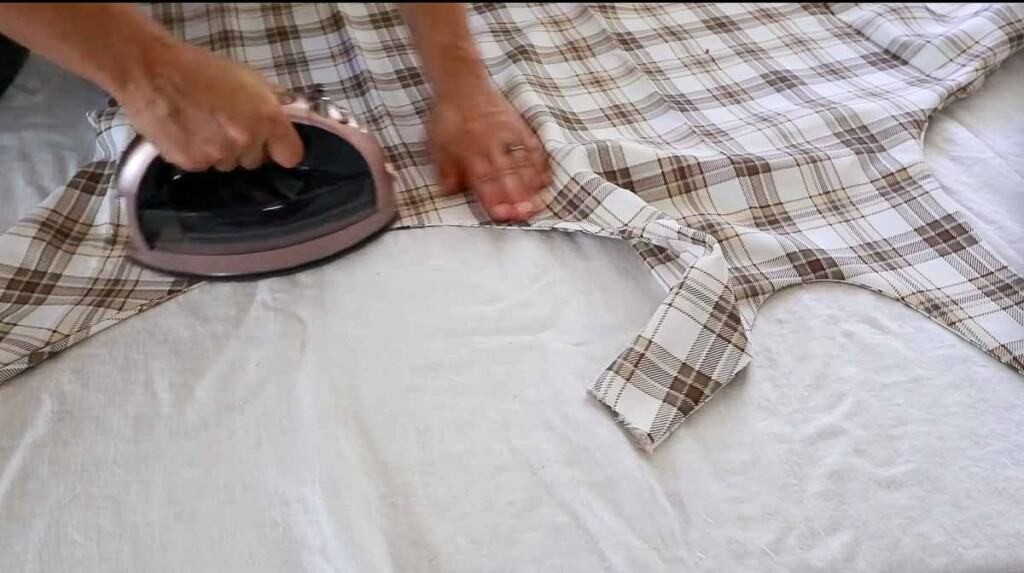
Turn the straps right side out and press flat.
Turn the raw edge on the open straps inward about 1/2 inch and press.
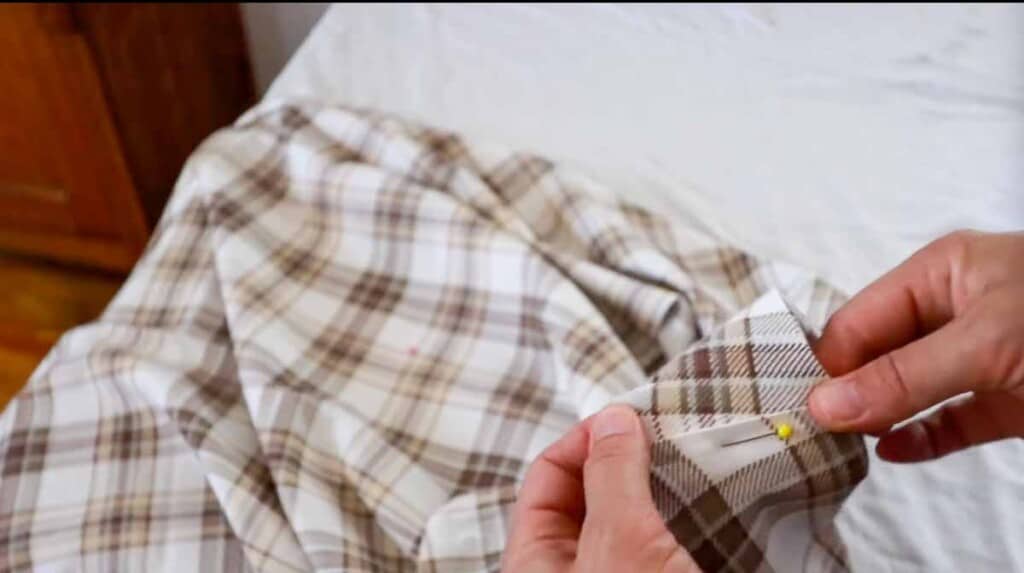
Create the cross by taking the strap from one side and attaching to the strap on the other side. Just place one of the straps into the opening of the other strap, pin, and stitch across to secure.
Create the Pockets
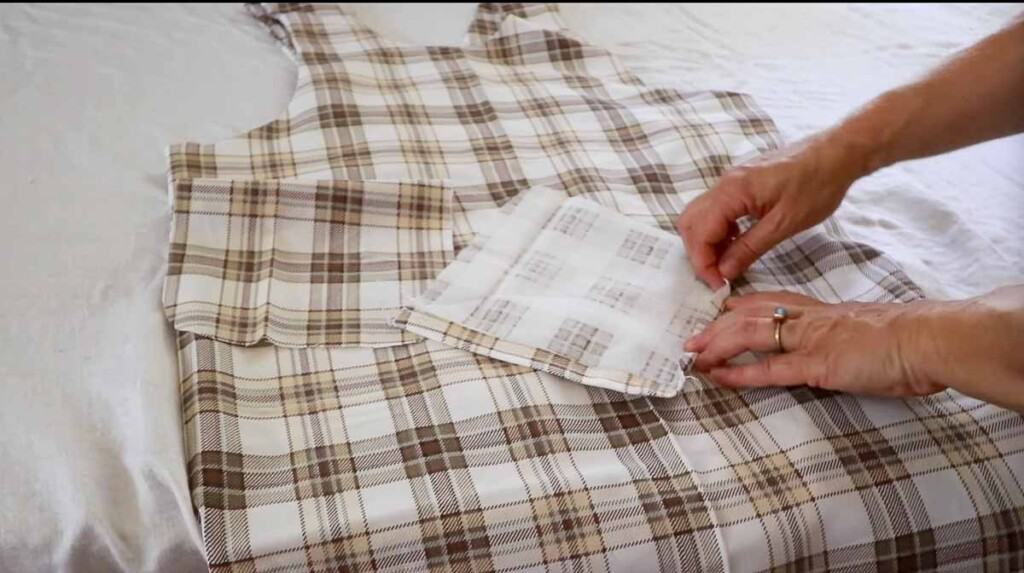
Take the pockets and fold over the top about 1/2 inch, then another 1/2 inch, press, and hem. Repeat with both pocket pieces.
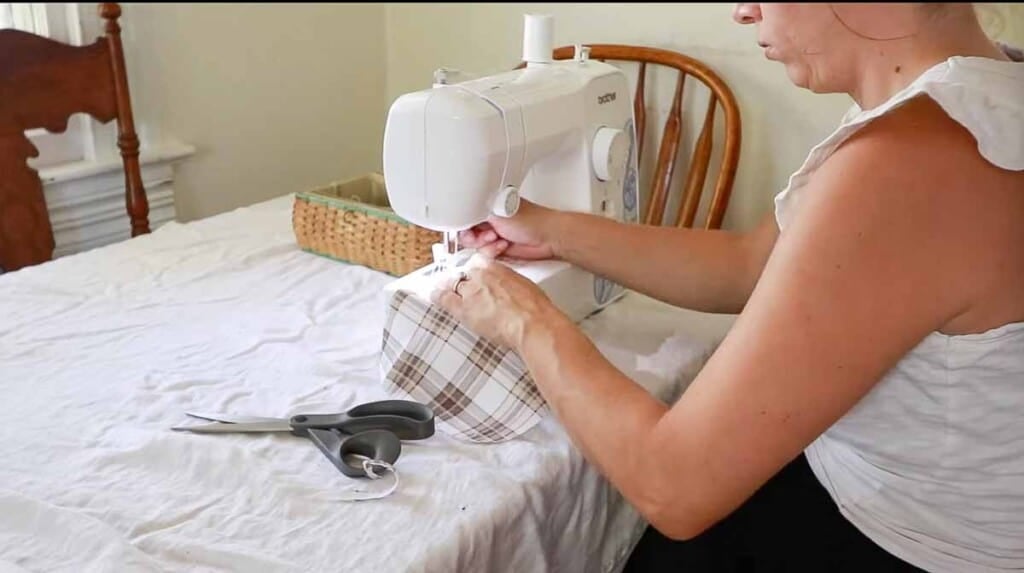
Fold over the sides of the pockets about 1/4 inch (there is a guide on the pattern, but I usually just estimate).
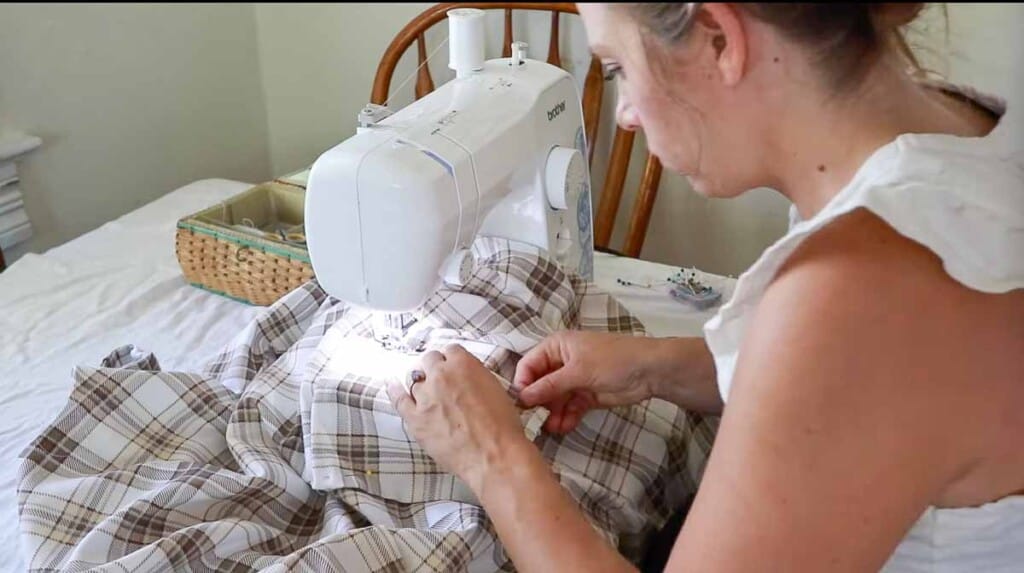
Place pockets in position and sew around the three sides, leaving the top opened.
Finish The Raw Edges
To finish off the apron, we need to finish the raw edges. You have two choices: you can hem it by folding it over 1/4 inch, then another 1/4 inch, and sewing, or you can use bias tape.
I decided to go with bias tape because of the curve.
To add bias tape, first sew a stay stitch about 3/8 of an inch from the raw edge. This is just a regular stitch that acts as a guide for the tape.
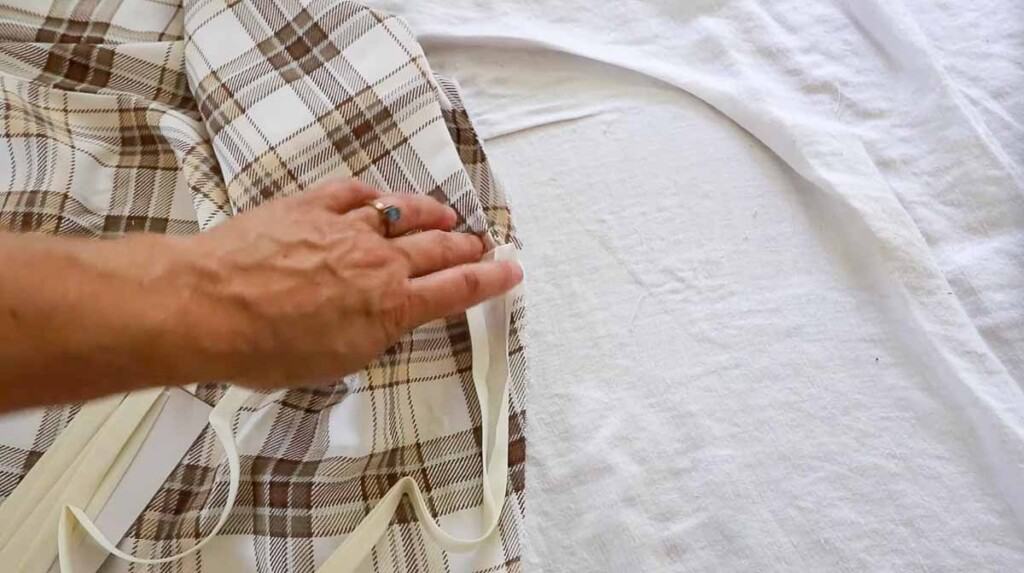
Starting on one edge, fold over the end of the bias tape about 1/4 inch, then pin it with the folded part of the bias tape around the stay stitch on the right side of the fabric. Pin it in place, then sew on the fold.
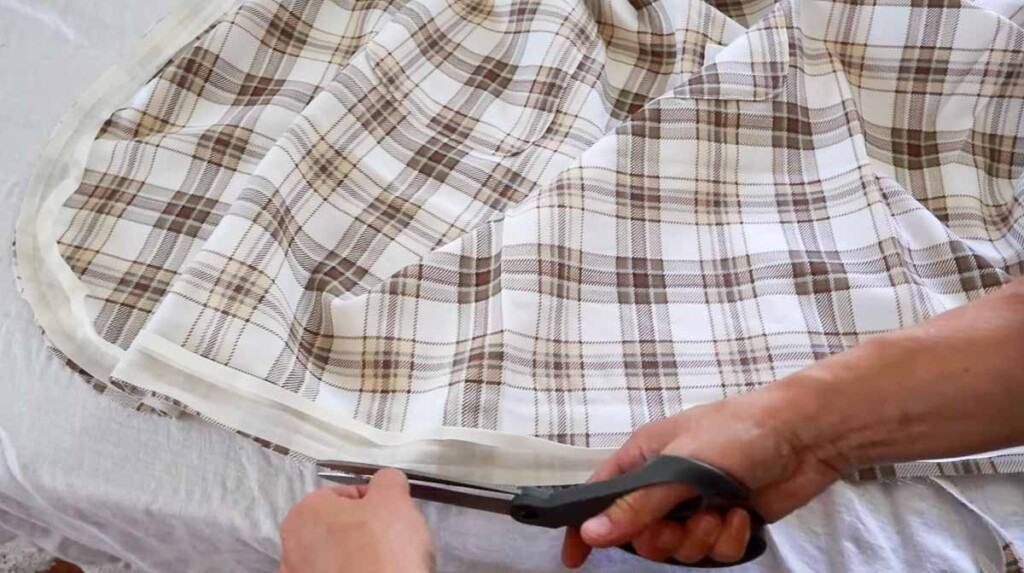
Trim any extra fabric to the edge of the bias tape.
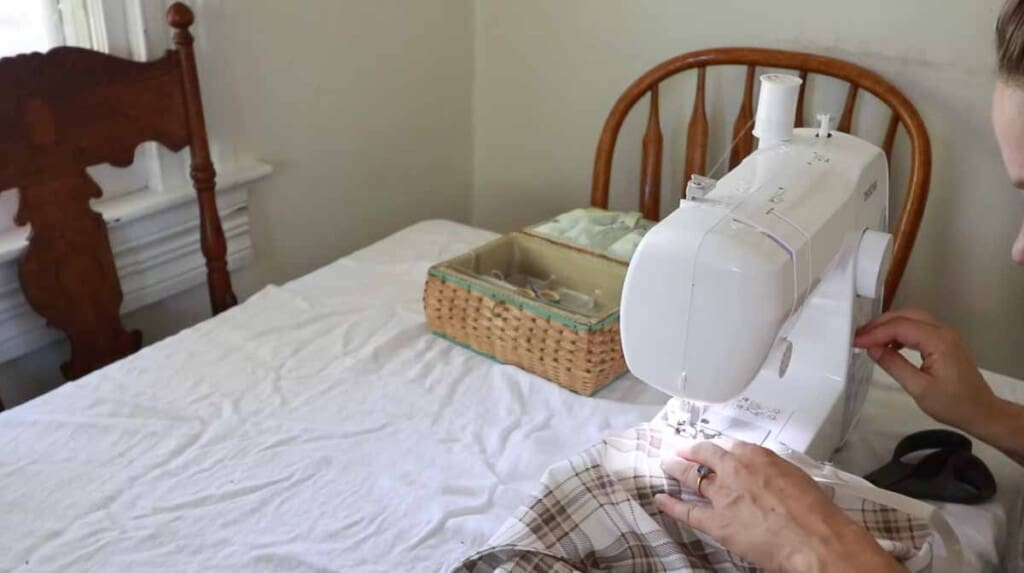
Sew bias tape following along the fold of the bias tape.
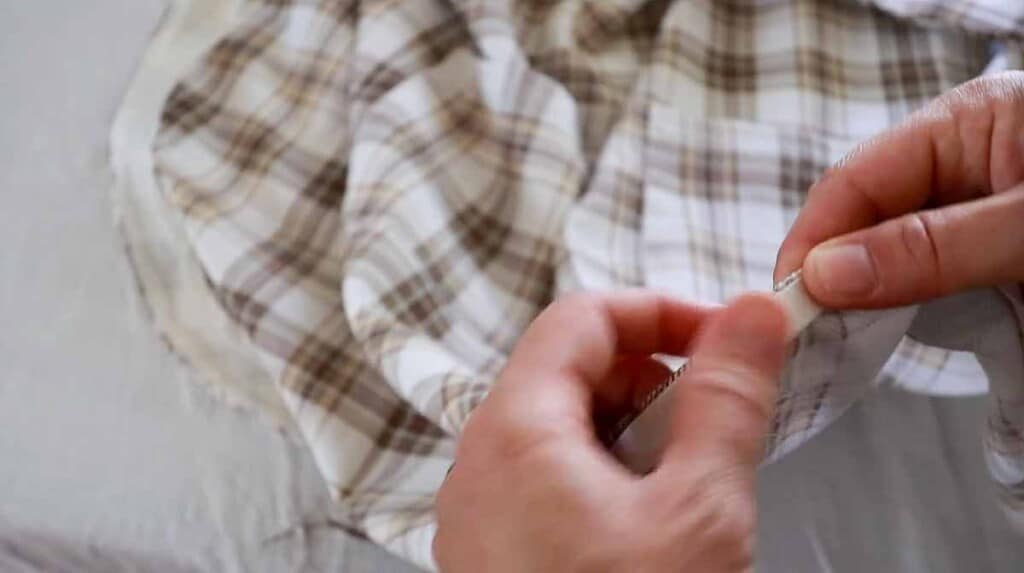
Fold over the bias tape and top stitch all the way around.
Repeat the same process on the raw edge of the interface.
Press, if needed, and you project is ready to go.
Print the pattern
Click HERE to download the pattern in full size.
Click HERE to print the pattern on your home printer.
Find More Sewing Projects:
- Ruffle Linen Pillow Cover Sewing Pattern
- How to Sew a Skirt
- DIY Ticking Stripe Curtain Sewing Tutorial
- DIY Tank Top – How to Sew a Tank Top
- Easy Girls Dress Sewing Tutorial- Bow in the Back Summer Dress
If you try this project and love it, I would love if you could come back and give it 5 stars!
Japanese Apron Tutorial With Free PDF Pattern
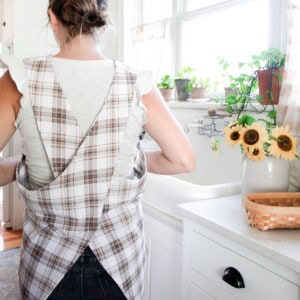
Equipment
- Sewing machine
- Sewing scissors
- Pins
- Iron
Ingredients
- 2 – 2 1/2 yards of fabric
- Coordinating thread
- Bias tape
Instructions
- Cut out the paper pattern.
- Wash, dry, and iron fabric.
- Fold the fabric in half and place the large, main section of the pattern along the fold and pin in place.
- Cut out the pattern.
- While the pattern is still pinned on, place pins to mark where the pockets belong. I added four pins at the corners to mark it.
- Lay the main apron piece down on a table or flat surface, pattern side up. Place the interfacing piece right-side down, matching up with main piece and pin.
- Sew all the way around, leaving the tops of the straps and the bottom open.
- Around all the curves of the straps and neckline, cut little slits just around the curves. Don’t cut into the seam line. This will help it lay flat.
- Turn the straps right side out and press flat.
- Turn the raw edge on the open straps inward about 1/2 inch and press.
- Create the cross by taking the strap from one side and attaching to the strap on the other side. Just place one of the straps into the opening of the other strap, pin, and stitch across to secure.
- Take the pockets and fold over the top about 1/2 inch, then another 1/2 inch, press, and hem. Repeat with both pocket pieces.
- Fold over the sides of the pockets about 1/4 inch (there is a guide on the pattern, but I usually just estimate).
- Place pockets in place and sew around the three sides, leaving the top opened.
- To finish off the apron, we need to finish the raw edges. You have two choices: you can hem it by folding it over 1/4 inch, then another 1/4 inch, and sewing, or you can use bias tape.
- To add bias tape, first sew a stay stitch about 3/8 of an inch from the raw edge. This is just a regular stitch that acts as a guide for the tape.
- Starting on one edge, fold over the end of the bias tape about 1/4 inch, then pin it with the folded part of the bias tape around the stay stitch on the right side of the fabric. Pin it in place, then sew on the fold.
- Trim any extra fabric to the edge of the bias tape.
- Fold over the bias tape and top stitch all the way around.
- Repeat the same process on the raw edge of the interface.
Press, if needed, and you project is ready to go.
Notes
- You have to place the the pattern very strategically so that it fits a two-yard piece of fabric. If you are only using two yards, you will have to cut the interfacing in two spots rather than on the fold, adding a little extra fabric to one side in order to sew it together down one side.
Nutrition information is automatically calculated, so should only be used as an approximation.






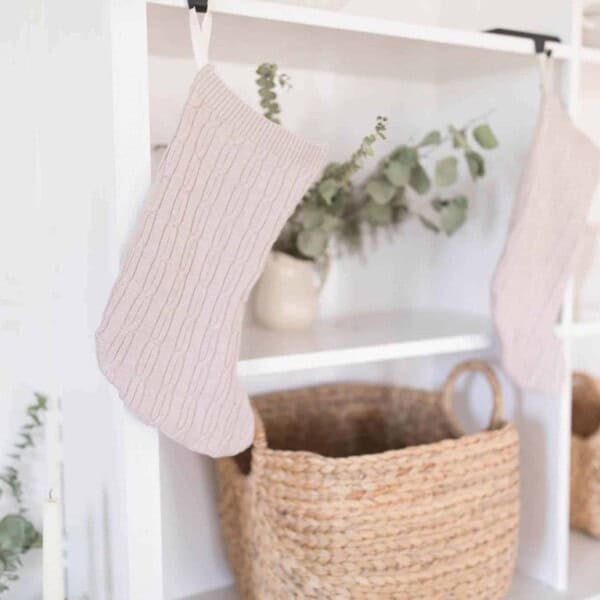

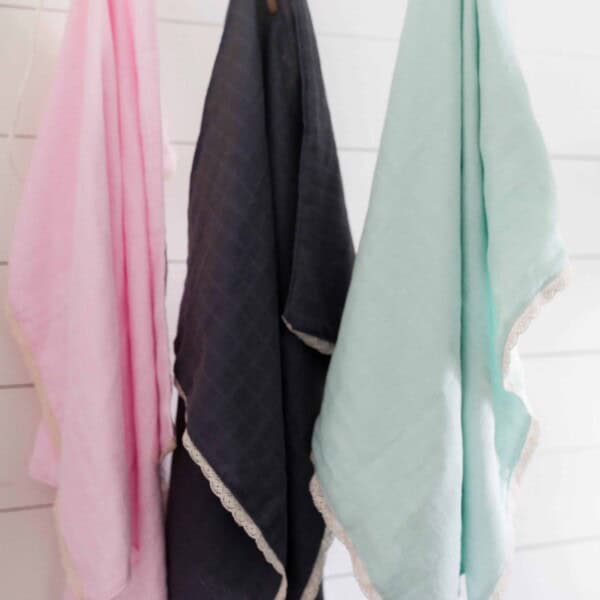
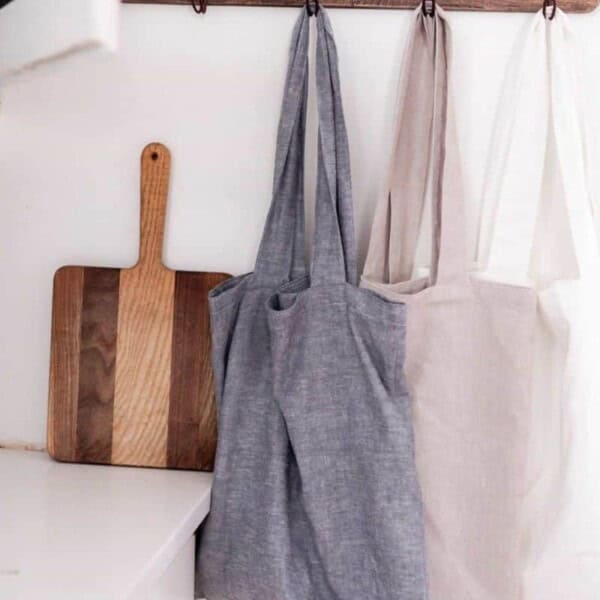






What’s the difference between the “Japanese apron” and the “cross back apron”?
As far as I know, they are the same.
Too many Ads …I could not share your apron video w my sister. Ad after Ad kept interfering. Not good..
Your instructions for the Japanese crossover apron say to “fold the fabric.” Which way? On the crosswise grain, or on the lengthwise grain of the fabric? There is a huge difference!
Thanks for sharing this pattern. The straps ended up too short for plus-size cooks, so I need to add in an extended piece. And I made it reversible.
I just found your pattern. Can I print this out on 8-1/2 x 11 or is it sized for A4 paper?
I can’t get the pattern to fit on my 44 inch material. I had it printed off at fedex & they measured the scale to make sure. What can I do?
Judy, I have the same issue.
The pattern is to wide.
Did you find a solution?
Thanks Josie
I just shortened the pattern about a 1cm to make it fit the grain of the fabric.
Thank you so much, Lisa, for this cute pattern! I’ve been wanting to make this style apron for awhile, so this is perfect timing.
I have to share with you how much I admire you and your family for the lifestyle you have chosen. I adore how you and your husband get all the children, even little David, involved in the daily chores, and they all look so happy. It’s so wonderful to not see a cell phone glued to their hands or their heads bent over some other social media. And lastly, I’m so excited to see Baby 7, and a girl would be nice…healthy either way! I’m being very Grandmotherly and checking every day to see if you are now a family of “9!” Much good luck on the delivery, Lisa.
Thank you! I can’t wait to make this apron.
My only change will be to cut two full pattern pieces instead of a facing so the apron can be reversible. It will take more fabric but I’m sure I can find two coordinating pieces in my stash. Or I’ll make one side a patchwork.
I never realized there was a Japanese style apron… I have seen this style somewhere, but never really thought about it.
Just found your site from a YT video. Been searching for a great granola recipe tonight.
Love to see families doing their best to live as simple as they can. It’s a lot of work, I know, but making food from scratch really does make us healthy.
Hope you and your family are doing well and are happy.
Thank you so much!
I’m curious if I want to make a matching one for my daughter, would there be a way to size it down when it was printed, or is there a better suggestion you have?
Thanks!